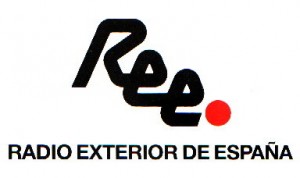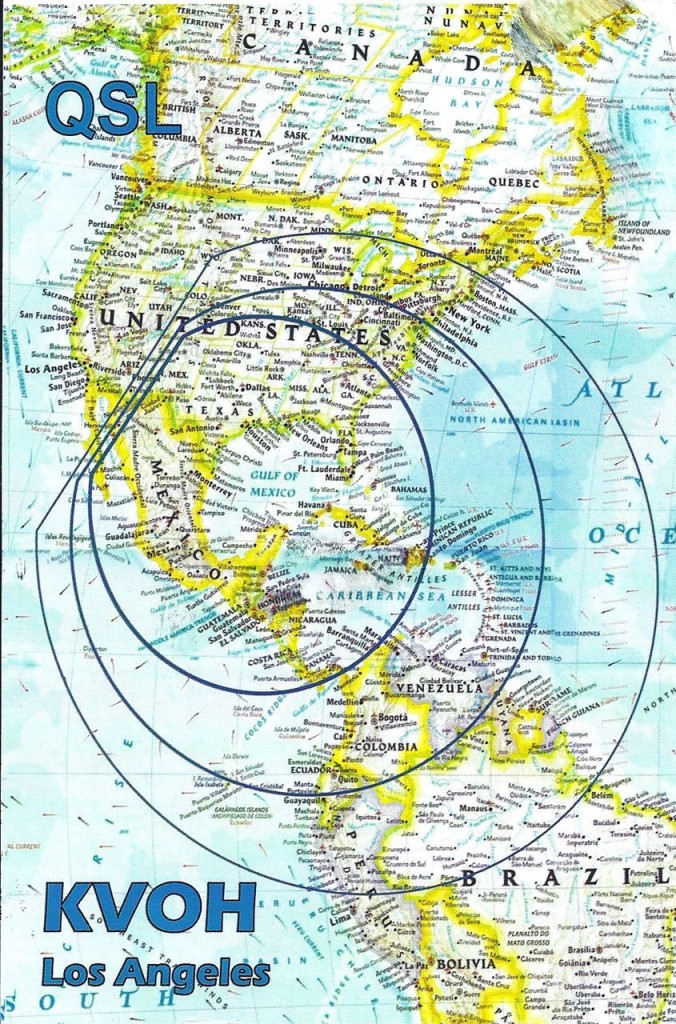My good buddy and SWLing Post reader, Mike, recently mailed the QSL card he received from KVOH after one of their test broadcasts. I’m glad he sent it to share–I love the front of the QSL card, which shows the footprint of their signal:
Polish Radio External Service abandons shortwave
 Many thanks to SWLing Post reader, Dominik, who writes:
Many thanks to SWLing Post reader, Dominik, who writes:
Polish Radio has recently announced closure of their remaining shortwave services. Currently they are on air two times a day with programmes in Polish, Belarussian and Russian. They are going to abandon those transmissions at the beginning of B13 season.
http://external.polskieradio.pl/8/86/Artykul/150501,Nasze-audycje-27-pazdziernika-znikna-z-fal-krotkich says:“Mamy dla Pa?stwa komunikat – od 27 pa?dziernika 2013 roku nasze audycje przestan? by? nadawane na falach krótkich.”
We have an announcement for you – from 27th October 2013 we will no longer broadcast our programs on shortwave.
There is a similar announcement on the Belarussian service’s webpage.
Lithuanian mediumwave relay of Polish Radio isn’t mentioned anywhere, so it may remain on air.
Polish Radio is now heavily promoting its DAB+ transmissions, so they are even advising listeners of their external service to listen on digital radios. Funny thing is that digital signal is currently available only in two cities in Poland, not to mention horribly poor audio quality on the external programme (72kbps AAC+).
This reminds me that it was only in March 2012 when the Polish Radio External Service stopped their English language broadcasts over shortwave.
Radio Paisano QSL
Last week, I listened to and recorded the pirate radio station, Radio Paisano. Three days ago, I received this message along with a QSL card:
Radio Paisano is a novelty shortwave pirate station that celebrates Columbus Day, and features the music of Lou Monte and the comedy of Pat Cooper. This was the eighth year that we were on the air.
Attached is your e-QSL.
Grazie,
Luigi
 Many thanks for the note and QSL card, Luigi!
Many thanks for the note and QSL card, Luigi!
I look forward to catching Radio Paisano next year.
AM sync lessens noise in this The Voice of Greece broadcast
 Sometimes, the Voice of Greece plays very little Greek music; October 10th was one of those occasions. Nonetheless, I recorded that evening’s broadcast.
Sometimes, the Voice of Greece plays very little Greek music; October 10th was one of those occasions. Nonetheless, I recorded that evening’s broadcast.
Using AM sync for sideband noise
In the first hour of the 10/10 VOG broadcast, you’ll hear a pulsating noise from an unknown origin (possibly a jammer?). The noise was centered about 20 kHz above VOG.
Fortunately, most of the noise was in the upper side band of the VOG signal, so I was able to mitigate it by using an AM sync lock on the lower side band. Without AM sync, this VOG broadcast––and its music mix––was almost inaudible.
If you have a synchronous detector on your receiver and tune in a station with interference, always try turning on sync lock and locking it on either the upper or lower sideband. If most of the noise resides in one of the sidebands, the lock can help tremendously. I often use this method while listening to AM pirate radio stations in noisy conditions.
A confession…
I have no idea what she’s talking about–it could be something absolutely mundane–but I love this radio host’s voice as she speaks and Pink Floyd’s Comfortably Numb begins. (Start listening around 26:00)
Click here to download more than two hours of the Voice of Greece, recorded on October 10, 2013, starting around 03:15 UTC on 9,420 kHz, or simply listen via the embedded player below. Most of the noise disappears around 00:21:
Data shows pirate radio activity nearly doubles during shutdown
 SWLing Post reader, Chris Smolinski of the HF Underground, has shared data he has collected from listener-submitted pirate radio logs prior to and following the US government shutdown. The results are intriguing.
SWLing Post reader, Chris Smolinski of the HF Underground, has shared data he has collected from listener-submitted pirate radio logs prior to and following the US government shutdown. The results are intriguing.
Chris writes:
“I have some concrete data for you here:
http://www.hfunderground.com/board/index.php/topic,13187.0.htmlAs you can see by the graph, activity is almost double.”
Many thanks for collecting, analyzing, and sharing this data, Chris!
Readers, if you’re into shortwave pirate radio, the HF Underground is my favorite place to view live pirate radio logs. Check them out! You can create an account to submit your own pirate logs.
Purple Power: Another solution for sticky radios
Many thanks to Mike Nikolich (N9OVQ), who writes with another solution for sticky radios:
After the display on my Eton E-1 receiver died, the good folks at Universal Radio swapped my broken but lightly used radio for a factory reconditioned unit. Fred Osterman warned me that the plastic case was sticky and somewhat gross and he wasn’t kidding, but I was still grateful that he had a replacement radio.
After searching around the Internet (including your blog) and trying various cleaners and solutions that didn’t remove the dirt and grime from the radio (such as rubbing alcohol, Gunk and dishwasher detergent), I went to my local O’Reilly Auto Parts store and asked if they had a recommendation. Their solution was a product called Purple Power ($4.49) and a microfiber shammy mitt ($4.50). In less time than it took me to watch an episode of “Dr. Phil,” my Eton cleaned up beautifully, with no damage to the unit — it looks and feels brand new. The plastic retained that nice tacky feel without all of the stickiness that attracts gunk like dust, hair and other crud.
Purple Power is made by Aiken Chemical. You’ll want to have a clean bucket of water to remove the gunk that Purple Power removes from the plastic — it really was disgusting but I won’t hesitate to give the radio a Purple Power bath the next time it starts getting gross. And, no, I’m not affiliated with Purple Power, Eton or anyone else, including the microfiber shammy!
Radio Exterior de España to close Costa Rica shortwave relay station
 Many thanks to SWLing Post reader, Martin Delfin, for this news from REE and for his translation:
Many thanks to SWLing Post reader, Martin Delfin, for this news from REE and for his translation:
Hi Thomas– This was just posted today on the Radio Exterior website:
http://www.rtve.es/radio/20131014/loteria-navidad-radio-exterior/764480.shtml
This is [my] English translation:
From October 28, Radio Exterior de España will permanently conclude its shortwave transmissions from its relay station in Cariari, Costa Rica. At the same time, from that date, broadcasts from its transmitters in Noblejas, Spain will be considerably expanded.
These changes will affect those listeners in Central America, North America and the northern part of South America’s Southern Cone who tune us.
In the coming days, we will post and announce our new frequencies and times in which you can hear Radio Exterior de España on our webpage and programs.
73s Marty Delfín, Madrid, Spain



